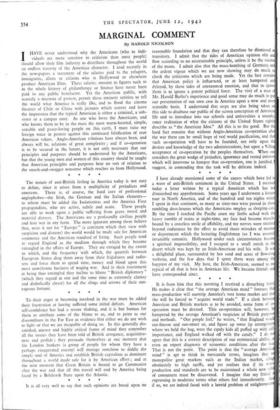It is from him that this morning I received a
disturbing lette He makes it clear that " the average American mind " foresees th mass-production will outstrip America's vast home market and tha she will be forced to " acquire world trade." If a clash betwee American and British markets is to be avoided, some form of c tl operation must be devised. This co-operation will, however, hampered by the average American's suspicion of British purpos and methods. " Our people feel," he writes, " that England woul out-finesse and out-smart us, and figure up some jip arrangem where we held the bag, were the candy kids all puffed up with se] importance, and England walked off with the candy." I do agree that this is a correct description of our commercial ability, even an expert diagnosis of economic conditions after the w That is not the point. The point is that the " average Americ mind " is apt to think in mercantile terms, imagines that monopolise great markets such as the Indian market, dm obstinately to high tariffs, and yet realises that if its rims production and standards are to be maintained a whole new orb of consumers must be discovered. I imagine that my friend expressing in moderate terms what others feel immoderately. An if so, we are indeed faced with a horrid problem of enlighterunen


























 Previous page
Previous page